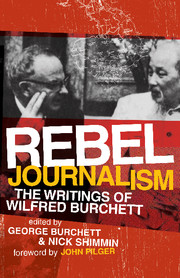Book contents
- Frontmatter
- Contents
- List of Photographs
- Acknowledgements
- Foreword by John Pilger
- Foreword by Gavan McCormack
- Introduction
- 1 The Atomic Plague [1945]
- 2 With Mick Griffith to the Plaine des Lacs [1941]
- 3 Who is Wingate Anyway? [1944]
- 4 The Trial of Cardinal Mindszenty [1951]
- 5 Liberty in Eastern Europe [1951]
- 6 The Microbe War [1953]
- 7 Koje Unscreened [1953]
- 8 The Ball-Point Pen Murders [1954]
- 9 South of the 17th Parallel [1955]
- 10 Front-Line Village [1959]
- 11 Welcome Home [1961]
- 12 Gagarin: The First Interview with Western Journalists [1961]
- 13 Virgin Lands [1962]
- 14 Lilac and Outer Space [1962]
- 15 War Against Trees [1963]
- 16 The Tragedy of South Vietnam's Ethnic Minorities [1964]
- 17 Interview with General Vo Nguyen Giap (April 13, 1964)
- 18 A Fortified Hamlet [1965]
- 19 Patriots & Mercenaries [1965]
- 20 At Ground Level [1966]
- 21 A Spurned Olive Branch [1967/1977]
- 22 Personal Leader [1968]
- 23 The Tet of Peace [1973/1977]
- 24 ‘Something from Nothing’ Township [1976]
- 25 Evaluating the Past [1976]
- 26 Mercenaries: British Export Model [1977]
- 27 The Geneva Conference [1978]
- 28 How to be a Good Khmer Rouge [1981]
- 29 China Prepares to Attack Vietnam [1981]
- 30 Afterword [1983]
- Notes
- Bibliography
- Index
23 - The Tet of Peace [1973/1977]
Published online by Cambridge University Press: 22 September 2009
- Frontmatter
- Contents
- List of Photographs
- Acknowledgements
- Foreword by John Pilger
- Foreword by Gavan McCormack
- Introduction
- 1 The Atomic Plague [1945]
- 2 With Mick Griffith to the Plaine des Lacs [1941]
- 3 Who is Wingate Anyway? [1944]
- 4 The Trial of Cardinal Mindszenty [1951]
- 5 Liberty in Eastern Europe [1951]
- 6 The Microbe War [1953]
- 7 Koje Unscreened [1953]
- 8 The Ball-Point Pen Murders [1954]
- 9 South of the 17th Parallel [1955]
- 10 Front-Line Village [1959]
- 11 Welcome Home [1961]
- 12 Gagarin: The First Interview with Western Journalists [1961]
- 13 Virgin Lands [1962]
- 14 Lilac and Outer Space [1962]
- 15 War Against Trees [1963]
- 16 The Tragedy of South Vietnam's Ethnic Minorities [1964]
- 17 Interview with General Vo Nguyen Giap (April 13, 1964)
- 18 A Fortified Hamlet [1965]
- 19 Patriots & Mercenaries [1965]
- 20 At Ground Level [1966]
- 21 A Spurned Olive Branch [1967/1977]
- 22 Personal Leader [1968]
- 23 The Tet of Peace [1973/1977]
- 24 ‘Something from Nothing’ Township [1976]
- 25 Evaluating the Past [1976]
- 26 Mercenaries: British Export Model [1977]
- 27 The Geneva Conference [1978]
- 28 How to be a Good Khmer Rouge [1981]
- 29 China Prepares to Attack Vietnam [1981]
- 30 Afterword [1983]
- Notes
- Bibliography
- Index
Summary
The following chapter from Grasshoppers & Elephants demonstrates Burchett's writing at its best, his ability to integrate the personal experiences of ordinary people with the developments of great political events. The Paris Agreement was of huge historical significance, but here Burchett also describes what it meant to the people of Hanoi.
The Agreement was based on a draft written in October 1972. In a meeting with Henry Kissinger, North Vietnamese negotiator Le Duc Tho had agreed that the Saigon regime could remain in power. Kissinger held a press conference in Washington during which he announced that ‘peace is at hand.’
When South Vietnamese President Nguyen Van Thieu was presented with the draft of the new agreement, he was furious with Kissinger and Nixon and refused to accept it without significant changes. He then made several public and radio addresses, claiming that the proposed agreement was worse than it actually was. Hanoi then believed it had been duped into a propaganda ploy by Kissinger. On 26 October Radio Hanoi broadcast key details of the draft agreement.
As U.S. casualties mounted throughout the war, American domestic support for it had deteriorated, and by 1973 there was major pressure on the Nixon administration to withdraw. Consequently, the U.S. brought great diplomatic pressure upon the South Vietnamese to sign the peace treaty even if the concessions Thieu wanted could not be achieved. With the U.S. committed to disengagement (and after threats from Nixon that South Vietnam would be abandoned if he did not agree), Thieu had little choice but to accede.
On 15 January 1973, Nixon announced a suspension of offensive actions against North Vietnam. Kissinger and Tho met again on 23 January and signed off on a treaty that was basically identical to the draft of three months earlier. The agreement was signed by the leaders of the official delegations on 27 January at the Majestic Hotel in Paris.
Le Duc Tho and Henry Kissinger were jointly awarded the 1973 Nobel Peace Prize for their efforts in negotiating the Agreement. However, Tho declined to accept the award, stating that there was still no peace in his country. Tho is the only person to have turned down the Peace Prize.
- Type
- Chapter
- Information
- Rebel JournalismThe Writings of Wilfred Burchett, pp. 230 - 241Publisher: Cambridge University PressPrint publication year: 2007

